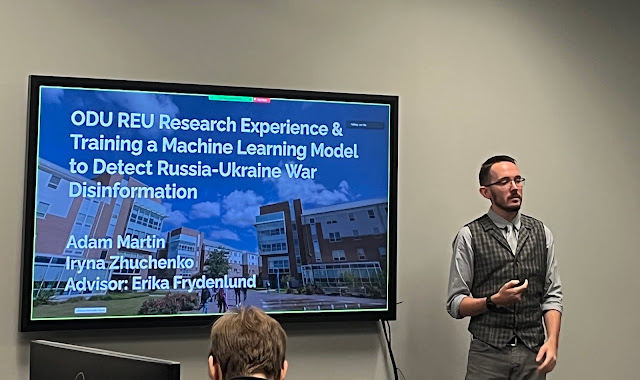2024-01-30: Disinformation Detection and Analytics REU Program - Final Presentations
 |
| Adam Martin presenting his work at 2023 REU Final Presentation Session |
The final presentations of the @oducsreu program have started with a brief introduction/ updates from Dr. Wu (@fanchyna)@WebSciDL @NirdsLab pic.twitter.com/aTqaCNxErD
— Bhanuka Mahanama (@mahanama94) August 3, 2023
Michael Evans (@mevansci) advised by Dr. Jian Wu (@fanchyna)
First presentation: "Scientific News Verification with GPT" by @mevansci. The study explores building scalable and domain-adaptable scientific claim verification methods using LLMs (GPT 3.5). Advisor: @fanchyna pic.twitter.com/QqGicxXTvP
— Bhanuka Mahanama (@mahanama94) August 3, 2023
Adam Martin (@AdamMartinTech) advised by Dr. Erika Frydenlund (@ErikaFrydenlund)
.@AdamMartinTech is now presenting his work on detecting Russia-Ukraine war disinformation.
— Bhanuka Mahanama (@mahanama94) August 3, 2023
Advisor: @ErikaFrydenlund
@VMASC_ODU @storymodelers pic.twitter.com/U07ZuPlgFx
Rachel Zheng (@rachel_z_03) advised by Dr. Michele Weigle (@weiglemc)
.@rachel_z_03 presenting her work on “Exploring the Challenges in Archiving
— Gavindya (@Gavindya2) August 3, 2023
Instagram” @oducsreu 2023 Final Presentations. She worked on pinpointing when redirects to the Instagram’s login page became prominent. @WebSciDL @oducs @ODUSCI @weiglemc pic.twitter.com/8o9Xu59AVP
Isabelle Puwo (@IsabellePuwo14) advised by Dr. Anne Perrotti
Next presentation: @IsabellePuwo14 is presenting their work, "Exploring TikTok as an appropriate teaching tool for general education teachers, special education teachers, and speech-language pathologists"@ODUSCI @oducs pic.twitter.com/bDx6JHzMxI
— Bhanuka Mahanama (@mahanama94) August 3, 2023
Johnovon Richards (@Johno_RichCS) advised by Dr. Faryaneh Poursardar (@Faryane)
.@Johno_RichCS is presenting his work titled “Leveraging Data Analysis and Machine Learning to Authenticate Yelp Reviews through User Metadata Patterns” @oducsreu 2023 Final Presentations.
— Himarsha R. Jayanetti (@HimarshaJ) August 3, 2023
Mentor: Dr. Faryaneh Poursardar (@Faryane)@WebSciDL @Nirdslab @oducs @ODUSCI pic.twitter.com/6AtQ2W8wK1
Parker Story (@ParkerStory_) advised by Dr. Vikas Ashok (@vikas_daveb)
.@ParkerStory_ concluded the @oducsreu 2023 Final Presentations event by presenting his work titled “Dark Pattern Webpage Ads: Impact on Screen Reader Users ”.
— Himarsha R. Jayanetti (@HimarshaJ) August 3, 2023
Mentor: Dr. Vikas G. Ashok (@vikas_daveb)@accessodu @WebSciDL @Nirdslab @oducs @ODUSCI pic.twitter.com/UlGdl7PgzD
Comments
Post a Comment